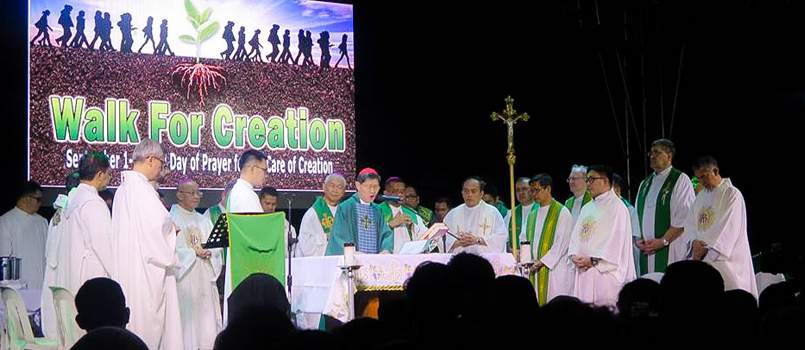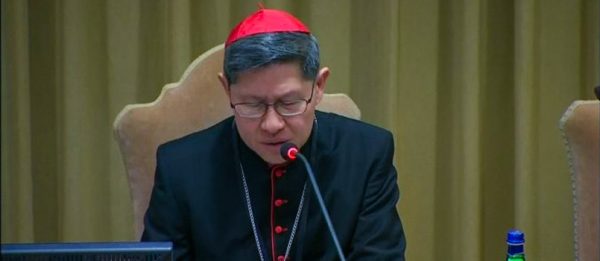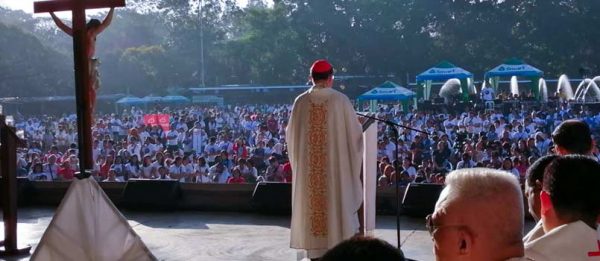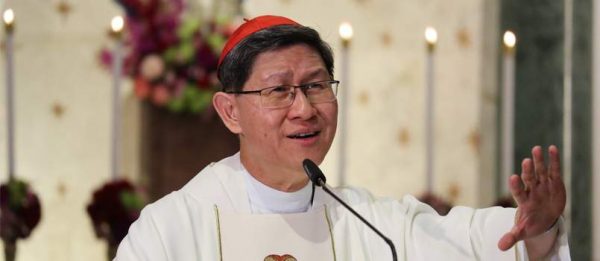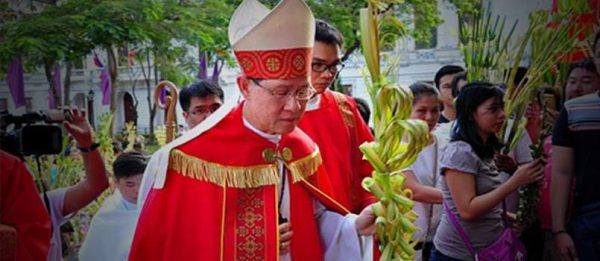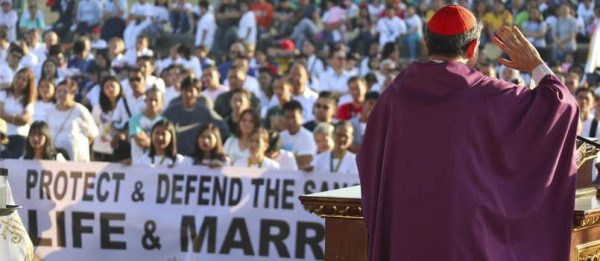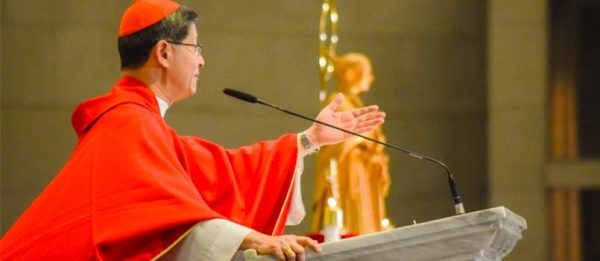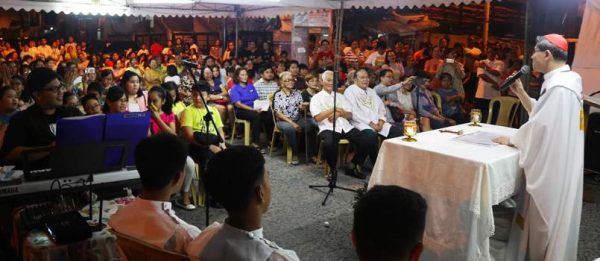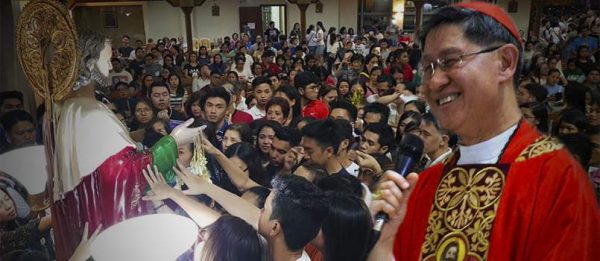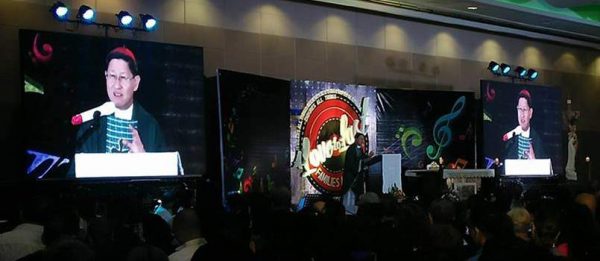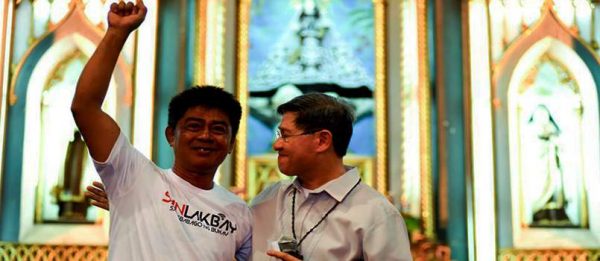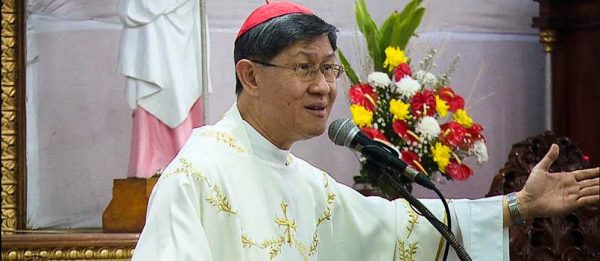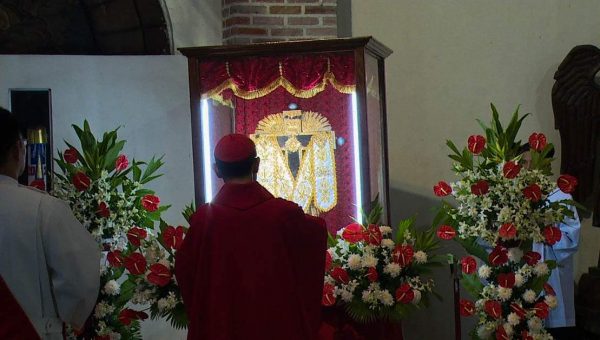5,683 total views
Luneta Park, Manila
September 1, 2017
Maraming salamat po sa pakikiisa sa araw na ito. This is happening not only in this spot, in the world, we are united with the whole Catholic Church at least for the day of prayer for the caring of creation and we also unite ourselves with our Muslim brothers and sisters on this holy day for them and in a special way we unite ourselves with our brothers and sisters in Marawi.
We pray that caring in the sense of responsibility for each other and for the beautiful creation that we have all inherited may prevail.
For the Archdiocese of Manila, today we also open the Season of Creation until the Sunday closest to the feast of St. Francis of Asisi. Parang hindi kayo masaya? nakikinig lang. There are many things that we can and should reflect on, but we will not end itong walk, and we hopefully that the walk will be also a time to continue reflecting.
But the readings provide for us in the Eucharistic celebration also, they provide for us some sort of a framework for reflecting on the significance of this day and of this season. Let me start with the first reading on the first letter of St. Paul to the Thessalonians, where he reminds us that our calling, our vocation as followers of Christ is sanctification, which is a gift of the Holy Spirit , we cannot be Holy by our own efforts. God is holy, holy, holy Lord God of all. Only God is holy, but we are called to be God likeness, that’s holiness.
We are called to be like Jesus, the holy one of God. Our calling is holiness, pagiging makadiyos. I think part of our mission today and in the coming years is to include more consciously the caring for creation as part of holiness. Kasi, we participate in holy events, but immediately after the holy event or even during the holy event, we do not see caring for creation.
Minsan sisimba, kakain ng kendi habang nagsisimba, tapos yung balat ng kendi itatapon doon sa baba, para bagang yung caring for creation is an extra-curricular activity and not yet integrated into my discipleship, my being holy as a calling. I think it is part of the celebration of this day and of the season to impress upon all of us specially the young ones that holiness includes as an integral part of discipleship and holiness, being Godlike after all God is the source of all, God is the creator, so God is the first to care for creation and if we want to be Godlike, holy, then we should be like God, in caring for all beings.
Yun ho ang unang panawagan. Alam ko marami dito cathechist, marami po tayong mga BEC, bible sharing group, coordinators and mga teachers nandito, parents, puwede ho ba na atin pong ipunla yun? Bahagi ng kabanalan, bahagi ng buhay na pagsunod kay Hesus ang pangangalaga at tamang pangangasiwa ng san nilikha.
The next point my dear brothers and sisters, that I want to dwell on is the very word used by Pope Francis in the encyclical, caring for our common home. Laudato Si is not a document just on climate change, some people say that encyclical on climate change,” hindi. It is about caring for creation as part of our spirituality. And it is appropriate for our time, especially in our country. What has happened to caring? Kumusta na ba ang tinatawag nating kultura, culture of caring? Minsan malimit mo pang marinig, “I don’t care!” o kaya, people are careless. Ano ang mangyayari sa kultura, sa tao na hindi na marunong ng tinatawag nating caring?
And it is I think urgent for us to preserve, to nurture, a culture of caring, for without caring, we destroy creation and destroy human lives. That’s why for this opening day, this day of prayer, the Holy Father ask us to listen to two cries, the cry of the earth the cry of creation, and the cry of the poor, because the poor are the first victims of the misuse of creation. But the type of listening must generate a whole culture of caring. What does it mean to care; marami po yan pero let me focus on two. To care is to be concerned for someone or for something. Yun bang meron akong pananaw na kailangan ko, o kahit na parang natural na aking iniisip ang kapakanan ng iba. Tunay na pagmamalasakit, na ang kakontraryo ay yun bang, “wala akong pakialam basta gusto kong gamitin. Kung minsan hindi lang naman ang kalikasan ang ginagamit ng walang pakundangan at walang concern, pati tao, gagamitin na at kakasangkapanin na para sa mga huwad na Diyos.
Concern, pagmamalasakit. Naalala ko po nung ako’y elementary at highschool. Wala pa noong subject na stewardship, caring for creation, di ko nga narinig noon itong salitang stewardship, pero ngayon ko nakikita, hindi iyun itinuro as a subject pero itinuro bilang kultura at nagpapasalamat ako sa mga CICM fathers na nagturo sa amin.
Wala akong naitago na kahit na anong libro nung elementary at highschooll, bakit? Hindi naman kasi kami pinabili ng libro. Ang libro ay pag-aari nung eskwelahan at pinagagamit sa amin, pinahihiram sa isang kondisyon, alagaan mo yan. Alagaan mo yung libro kase hindi lang yan papel, nandyan ang dunong ng maraming henerasyon na ipinamamana sa iyo, at alagaan mo yang libro para magamit yan ng mga susunod na henerasyon ng estudyante.
And for 10 years, every day we took care of 10, 12 books and you are thinking of the next school year, the next batch of students who must benefit from those books. Kaya hanggang ngayon kahit yung mga leaflets, na ibinibigay sakin kapag fiesta, hindi ko maitapon. May isang pari, pumasok sa kuwarto ko, sabi, “Bishop, ano ba yang mga kinokole-kolekta mo? yung table mo wala nang masulatan. Sabi ko, hindi maatim ng puso ko na magpunit. Ngayon, taun-taon bumibili ng libro, “libro ko to!” “Susulatan ko ito!” wala nang [pakialam sa ibang gagamit]. Tama na. Itong sinasabi ko, we may be talking, talking, talking about stewardship as a topic, but the culture, how do we instill that and Pope Francis, talks about consumerism, how can we teach caring, concern, not only for an object like a book, but also for the next generation if the spending habits, the buying and the selling of goods, all these system is not supportive of a culture and attitude of stewardship?
Noon pati yung mga damit di ba mga [pinapamana sa susunod na gagamit]. Naala-ala ko kaya noon yung unang mga sapatos, “maluwag po ito, maluwag,” “O, lagyan natin ng cardboard, para yan na ang sapatos mo hanggang grade 3,” hindi yung sa isang taon e nakakalima ka [o] anim, kasi in one month, obsolete na yung modelo ng sapatos mo. The culture of obsolescence that makes us greedy, that exerts so much pressure, you have to conform to latest fashion, how do you combat that?
“May cardboard naman, pasikipin yung sapatos,” pati yung uniform noon malalaki ang allowance di ba, para pagtumaba-taba ka pwede naman tahiin yan. Di na tatastasin o ano, o kung ikaw naman ay lumiit, lalaki pa ulit yung allowance. Nagbibigay po ako ng ilang halimbawa para, it is through this mindset and the corresponding daily action of caring, being concerned simultaneously for what the earth produces for us, how the earth cares for us, how creation cares for us, do we care? And how about for the next generation? Ako my great learning and cultural acquisition of stewardship happened through the books. I wish Catholic Schools to teach stewardship by reviewing our connections with publication houses but concern for creation, a culture of concern, pagmamalasakit for creation and for human beings according to the first reading would require a lot of discipline. Sabi ni St. Paul, learn how to control your body, learn how to control your appetites, he is talking here about lustful relationships, but lust is not only in relationships, very often on a daily basis and more very often daily, lust is experienced in the way abuse the goods of creation and abuse human beings. So concern requires descipline. So yun po, unang kultura ng caring ay ibalik ang concern. Yun hong ano[concern], simulan natin, yung mga nakaupo, baka meron kayong hindi napapansin d’yan na nahihimatay na nakatayo o merong medyo mas mahina sa inyo, concern. Kapag sumakay sa jeep, sa bus, alam ko yung iba binubuksan agad yung libro, pocket book, para kung may umakyat man, “hindi ko na kita, nagbabasa kasi ako, nagtetext kasi ako,” ayan, nawala na ang concern. Tumingin, baka may nangangailangan.
The second and last thing po sa aking pagbabahagi ay responsibility. Part of caring is to assume responsibility for the others. Magkasama po yung malasakit at pananagutan, and alam naman natin yung opposite. Irresponsible behavior is a manifestation of pride. I can do what I want, I am not responding to anyone, I am not accountable to anyone, kaya I lose the sense of caring, if I don’t have any person to whom I will be accountable then I take everything into my hands but that is not the attitude of a steward. A steward knows that he or she will be answerable. A steward knows that he or she is not the creator, not the source, not the owner, kaya aalagaan ko ang ipinagkatiwala sa akin dahil mananagot ako sa tunay na may ari. So being a steward is to be humble, to be truthful, who am I, at sana poi tong kulturang ito ng pananagutan para sa ibinigay sa ating ng Diyos at para sa isa’t-isa ay huwag mawala.
Let the walk for creation, be also our way of promoting and protecting a very beautiful human and Filipino culture, a culture of caring which is very much threatened by so many idols. False gods, false creators of false worlds. Every false god is a false creator, and its creation is a false world, a phantasmal. Every false god and a false creator creates a false world which is a big lie, but it is packaged beautifully, you don’t even realize it is a lie, and so it attracts many inhabitants that care for that false world that are responsible in nurturing that world.
That is not the culture that we want. We want culture of true caring, of true responsibility for the creation of the true God and not the false world created by false gods. In the world created by God, there is harmony, there is interdependence, there is mutual support, there is mutual caring. Ngayon palang yung hangin, it cares for us, the earth cares for us, kaya hindi tayo lumulutang, there is a mutual caring, but in the false world, created by false gods, there is no room for mutual caring. If I can eliminate you because you’re a nuisance to me, then I am making my world better. If I could use you for my purposes then I have reconstructed my world according to my plan. But in the end, what spreads is a culture not of caring but of destruction, and in the end we destroy the earth, we destroy humanity.
A culture is supposed to build up through caring and responsibility. May warning yung gospel, the bridegroom will come at the time we do not expect, we do not know. Typhoons, earthquakes, disasters, in increasing intensities and degrees come, but we should be wise, we should be wise by being caring, by being responsible, for in the end we will be destroyed by the very destructive culture that we have propagate.
So let us enjoy this day, let us give thanks to God for this beautiful creation and I don’t know may kanta yata para sa preparation of the gifts pero bago sila kumanta kasi hindi na natin malimit naririnig this is one of the most, for me, most beautiful prayer in the mass, when the priest takes hold of the bread, we say, “Blessed are you Lord God of all creation for through your goodness we have this bread to offer you, fruits of the earth and work of human hands,” you remember the goodness of the earth, you remember the laborers, you remember the hands that cooperate with the earth, hands that are forgotten, hands that work but don’t receive their fair share.
But thanks to God who works through the earth and human labor, we have this bread, and by the power of the spirit, this bread will become the bread of life, will become the presence of Jesus. That’s how God cares for us, feeding us, with bread that becomes the bread of life, and if we care for each other our community becomes the body of Christ also, the community that praises God through caring and responsibility.

